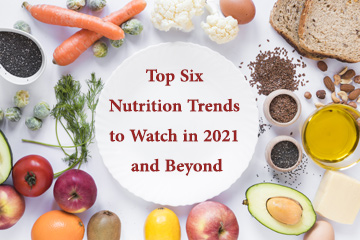
The year 2020 has brought major changes in behavior in people across the world. Their everyday habits and behaviors have changed dramatically. With unprecedented access to research-based information, consumers now have a better understanding of the link between nutrition and wellness. This is leading to greater personalization of diets.
According to experts, the following trends in nutrition will dominate in the year 2021 and beyond:
- Cooking at Home: Being in lockdown with limited social movement has reactivated people’s interest in cooking. They are unable to enjoy their favorite restaurant foods, unless it is takeout. As a result, more people have begun or returned to cooking at home and are finding it an enjoyable experience. Cooking at home allows people to personalize their food choices, which is healthier and less expensive. Preparing food along with family members also promotes family bonding and creates a more intimate experience than eating in a crowded restaurant. Cooking at home provides families with quick, healthy, and cost-effective recipes that are also tasty.
- Focus on Food Quality: Consumers wants more transparency in the foods they consume. They want to know where and how their food is grown and if any alterations were made to a product before it gets to the table. People have discovered new foods or have found alternatives to the foods they usually purchase. They are also becoming interested and knowledgable about the ingredients and nutritional content.
- Focus on Foods for Immune Health: The COVID-19 impact has made people understand the importance of nutrition for a healthy immune system. According to market research, in 2020, over 50% of consumers reported taking more supplements to support their immune health. In 2021 also, this interest in the health and wellness industry is expected to grow. People are focused on eating right to develop a strengthened immune system.
- Importance of Vitamin D: Vitamin D plays a crucial role in the functioning of the immune system. It supports positive mood, brain function, cognition, lung health, healthy weight, healthy pregnancy, bone health, etc. Achieving optimal levels of Vitamin D between 30 and 50 ng/mL through supplementation is vital to experience its full benefits. So, talk to your doctor, understand your vitamin D levels and include the supplement to your healthcare routine.
- Achieve Healthy Blood Sugar Balance: There are many options to support a healthy sugar balance. Avoid sugar-sweetened beverages, eliminate added sugar, etc. You can also add supplements that support your routine blood sugar balance based on your physician’s recommendations. This can help balance your blood sugar resulting in a better mood, more balanced energy levels, and overall long-term health.
- Climatarian: Consumers are shifting to buying organic to boost personal health, a trend described as “climatarian”. It means a person making food choices with the intention of changing how our food is grown- changing from a chemical-intensive model to one that promotes soil health, biodiversity, and healthy ecosystems, which is a crucial way to address climate change.
- Mental Health: Eating a minimally processed diet that is rich in a variety of nutrients can support mental health. Foods rich in antioxidants, vitamins, fiber, minerals, healthy fats like omega-3, etc., are linked to mental well-being. It is noticed that, in 2021, more food and beverages companies are coming out with products that contain ingredients to reduce stress and improve sleep, which is also linked to mental health.
The world will face a huge shift in the food industry in 2021. COVID-19 has changed people’s lives, and people will tend to focus more on eating food that has a purpose and boosts health. Focusing on healthy nutritious food and proper exercise can boost your immune system and improve health and quality of life.
